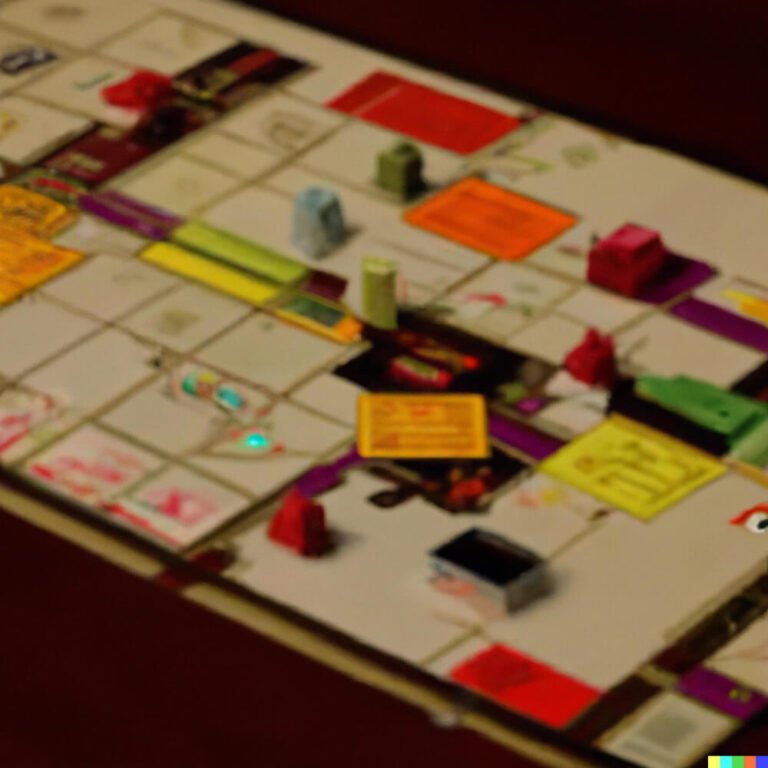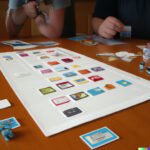Are you a fan of classic board games trivia? From the iconic game pieces to the famous players and game nights, there’s no shortage of fascinating facts and historical tidbits to explore.
In this article, we’ll dive into the world of classic board games and uncover the origins, designs, and impact of these beloved pastimes. Get ready for an entertaining journey through the history and popularity of classic board games as we set the stage for some fun trivia to come.
Classic board games hold a special place in our hearts, with timeless favorites such as Monopoly, Scrabble, and Clue captivating players for generations. But have you ever wondered about the origins of these beloved games? In the following sections, we’ll delve into their creation, share interesting facts about their inception, and explore how they have become ingrained in popular culture.
Beyond just playing the games themselves, classic board games also boast an array of iconic game pieces and designs that have become synonymous with gaming. Join us as we discuss the significance and evolution of these game components, from the familiar tokens to the distinct board layouts that have endured throughout the years. With so much rich history to uncover, get ready to test your knowledge with some challenging and entertaining trivia questions about classic board games.
The Origins of Classic Board Games
The history of classic board games is a fascinating journey that dates back centuries, and the origins of popular games such as Monopoly, Scrabble, and Clue are no exception. These beloved games have cemented their place in the world of entertainment and have become timeless staples in many households.
Monopoly: A Game Born Out of Economic Hardship
Monopoly, a game known for its competitive wheeling and dealing, was actually created during a time of economic hardship. The game’s original concept was designed by Lizzie Magie in 1903 as “The Landlord’s Game,” aiming to illustrate the negative aspects of accumulating wealth. Over time, Charles Darrow made his own version of the game in 1933 which has evolved into the Monopoly we know today.
Scrabble: From an Architect’s Love for Words
Scrabble, a game that challenges players to create words from letter tiles, was invented by Alfred Butts in the 1930s. Butts, an out-of-work architect during the Great Depression, developed the game as a way to combine his love for numbers and words. It wasn’t until 1948 when James Brunot began manufacturing and selling Scrabble that it grew in popularity.
Clue: A Game Inspired by Murder Mysteries
Clue, originally known as “Cluedo,” was created by Anthony E. Pratt during World War II in England. Inspired by murder mystery novels and films, Pratt wanted to invent a game that allowed players to play out their own detective stories at home. The game was eventually released for commercial sale in 1949 and has since captured the imaginations of people all over the world.
These classic board games hold intriguing origin stories that have contributed to their lasting popularity throughout history. The creativity and vision behind each game has provided entertainment for generations and continues to be cherished to this day.
Iconic Game Pieces and Designs
Classic board games are not only known for their gameplay, but also for their iconic game pieces and unique board designs. For example, Monopoly, one of the most popular classic board games, features game pieces such as the top hat, car, and thimble, each with its own significance and history. The game board itself is instantly recognizable with its colorful properties, cards, and money.
Similarly, Scrabble is known for its distinctive letter tiles and game board layout. The letter distribution in the game was carefully designed to ensure balance and fairness, adding to the strategic element of the game. The wooden letter tiles have become synonymous with the game itself, representing hours of fun and challenging wordplay.
Clue, another beloved classic board game, features a unique mansion floor plan as the game board and six distinct character pawns as playing pieces. The weapons used in the game are also iconic, including the candlestick, lead pipe, and revolver. These elements all contribute to the immersive experience of solving a murder mystery within the confines of a grand estate.
The evolution of these iconic game pieces and designs reflects both cultural shifts and advancements in manufacturing technology. Over time, these elements have become ingrained in popular culture and are instantly associated with the classic board games they belong to.
| Classic Board Game | Iconic Piece/Design |
|---|---|
| Monopoly | Top hat, car, thimble; Colorful property-filled game board |
| Scrabble | Wooden letter tiles; Unique letter distribution on game board |
| Clue | Mansion floor plan; Character pawns; Distinct weapons |
Classic Board Games Trivia Questions
Get ready to put your classic board game knowledge to the test with these challenging and entertaining trivia questions. Whether you’re a seasoned board game enthusiast or just looking for a fun way to test your know-how, these questions will surely entertain and educate you about some of the most beloved games in history.
- In the game of Monopoly, what is the name of the character who is depicted as a mustachioed man with a top hat, monocle, and white mustache?
- Scrabble was invented by Alfred Butts in How many tiles are used in the standard English version of the game?
- In Clue, how many weapons are featured in the original version of the game?
- What classic board game requires players to shout “Uno” when they have only one card left?
- In which classic board game do players buy and sell properties, build houses and hotels, and try to bankrupt their opponents?
- What is the name of the iconic ship piece in the game of Battleship?
- Which classic board game features a grid that represents letters and words where players form interlocking words crossword fashion?
Test your knowledge and then check out our answers section for explanations and historical tidbits about these classic board games.
Famous Players and Game Nights
Classic board games have brought joy and entertainment to people of all ages for decades. While many may associate these games with family gatherings or lazy Sunday afternoons, there are also famous players, celebrities, and historical figures who are known for their love of classic board games. From Hollywood stars to world leaders, these individuals have showcased their passion for games like Monopoly, Scrabble, and Clue.
Some notable figures who have publicly professed their love for classic board games include:
- Barack Obama: The former President of the United States is a known fan of Scrabble and has been spotted enjoying the game with his family.
- Beyoncé and Jay-Z: This power couple has been known to enjoy intense Monopoly battles during their downtime.
- Albert Einstein: The brilliant physicist was an avid chess player and often used the game to sharpen his mind.
Game nights involving classic board games have also become a popular pastime for many groups of friends, with lively competitions and memorable moments. Whether it’s a casual gathering or a high-stakes tournament, these game nights often create lasting memories and solidify friendships. Many people have stories to share about epic Monopoly battles that lasted until the early hours of the morning or nail-biting Clue games that kept everyone on the edge of their seats.
Classic board games have proven to be great equalizers, bringing people together regardless of their background or status. The enjoyment derived from playing these timeless games transcends age, gender, and cultural boundaries. So next time you gather around a game board with friends or family, remember that you’re in good company – just like some of your favorite famous personalities.
The Impact of Classic Board Games on Popular Culture
Classic board games have had a significant impact on popular culture, leaving an indelible mark on movies, TV shows, and literature. These games have become iconic symbols that are often referenced or featured in various forms of media. Here are some examples of how classic board games have influenced popular culture:
- Monopoly: This classic game has been featured in numerous movies and television shows, including “The Simpsons,” “Ace Ventura: Pet Detective,” and “Desperate Housewives.” Additionally, the game has been referenced in countless books and songs, cementing its status as a cultural phenomenon.
- Clue: The mystery-themed board game has inspired a cult film adaptation in 1985, which has since gained a dedicated following. The game’s characters and storyline continue to be parodied and referenced in popular culture, making it a beloved classic.
- Scrabble: As one of the most beloved word games, Scrabble has made appearances in various TV shows such as “The Office” and “Friends.” Its influence can also be seen in literature, with authors incorporating the game into their novels as a reflection of intellectual prowess and wordplay.
The enduring popularity of these classic board games has led to their integration into popular culture beyond just entertainment media. In addition to being featured in movies and TV shows, these games have become part of everyday language and idioms. Phrases such as “pass go,” “Miss Scarlet in the library with the candlestick,” or “triple word score” have all become synonymous with classic board games.
Furthermore, the nostalgic appeal of these games has resulted in numerous collectors’ items and merchandise. From themed t-shirts to novelty items based on iconic game pieces, classic board games continue to captivate new generations while retaining their influence on popular culture. Their timeless appeal ensures that they will remain integral parts of our cultural landscape for years to come.
Classic Board Games Collections and Memorabilia
Board games have been a popular form of entertainment for centuries, and with this popularity comes a thriving community of collectors. Classic board game enthusiasts are always on the lookout for rare and vintage editions to add to their collections.
Some collectors focus on a specific game, such as Monopoly or Scrabble, while others aim to gather a wide variety of games from different eras. In recent years, classic board game memorabilia and merchandise have also become highly sought after, including items such as vintage game pieces, original game boards, and promotional materials.
These collectors often place significant value on the condition of the games and memorabilia they acquire. Mint condition items or those with unique historical significance can command high prices at auctions and among fellow enthusiasts.
For example, a first edition Monopoly set from the 1930s in excellent condition recently sold for over $1400 at auction. With such high demand for classic board games collections and memorabilia, it’s no wonder that dedicated enthusiasts are constantly on the hunt for the next prized addition to their assortment.
The appeal of these collections goes beyond mere nostalgia; these items serve as tangible links to our past and represent an important part of our cultural heritage. Whether displayed in a private collection or shared with fellow aficionados at conventions and gatherings, classic board games collections and memorabilia provide a way for enthusiasts to connect with each other and celebrate the enduring legacy of these beloved games.
| Item | Estimated Value |
|---|---|
| First Edition Monopoly Set (1930s) | $1400 |
| Vintage Scrabble Game Pieces | $500 |
| Original Clue Game Board | $800 |
The Future of Classic Board Games
In the digital age, the future of classic board games may seem uncertain. With the rise of video games and online entertainment, some may question whether traditional board games will continue to hold their appeal. However, despite the advancements in technology, classic board games are proving to be timeless and are finding new ways to adapt and thrive.
Adapting to Modern Trends and Technology
Online and Mobile Versions
One way that classic board games are staying relevant is by embracing online and mobile platforms. Many popular board games now have digital versions that allow people to play with friends or strangers from around the world. This not only introduces these classic games to a new generation of players but also offers convenience for those who may not have access to physical game boards or pieces.
Incorporating Augmented Reality
Another trend that is shaping the future of classic board games is the incorporation of augmented reality (AR). By blending the physical and digital worlds, AR has the potential to enhance gameplay and bring new life to familiar classics. Imagine playing Monopoly with virtual properties popping up on your living room floor or solving Clue mysteries with interactive clues overlaid on real-life settings.
Embracing Cultural Diversity and Inclusion
Expanding Representation
As society becomes more diverse, there is a growing demand for representation in all forms of media, including tabletop games. Classic board games are adapting by expanding their character options, incorporating diverse themes, and offering more inclusive gameplay experiences. By doing so, these games remain relevant and appealing to a broader audience while celebrating diversity.
The Continued Relevance of Classic Board Games
Despite the rapidly changing landscape of entertainment, classic board games continue to stand the test of time due to their unique ability to bring people together, encourage social interactions, and provide timeless fun. With adaptations to modern technology and a focus on inclusion, it’s clear that these beloved classics will remain an important part of our cultural fabric for years to come.
Conclusion
In conclusion, classic board games hold a special place in the hearts of people around the world. From the origins of popular games like Monopoly, Scrabble, and Clue to the iconic game pieces and designs that have become ingrained in popular culture, these timeless games continue to bring joy and entertainment to players of all ages.
The impact of classic board games on popular culture is undeniable, as they have been featured in movies, TV shows, and literature, further solidifying their status as beloved pastimes.
As we look to the future, it’s clear that classic board games are not fading into obscurity despite the rise of digital gaming. Instead, they continue to adapt to modern trends and technology, ensuring that they remain relevant and appealing in the digital age. Whether it’s through collector’s editions or online versions of these classics, there are numerous ways for fans to continue enjoying these beloved games.
In closing, we encourage readers to delve deeper into the world of classic board games trivia and history. Whether it’s hosting a game night with friends or expanding your collection with rare and vintage editions, there are countless ways to continue embracing the enduring appeal and significance of classic board games. Keep rolling the dice, forming words on a Scrabble board, or solving mysteries in Clue – the world of classic board games is as vibrant and exciting as ever.
Frequently Asked Questions
What Are Some Curiosities About Board Games?
Board games have been around for centuries and have evolved in many ways. One curiosity about board games is that they were initially used as tools for teaching moral lessons and strategies. Another interesting fact is that the first board games were played in ancient Egypt, Mesopotamia, and Persia.
What Is the Most Popular Traditional Board Game?
The most popular traditional board game is chess. It has stood the test of time and is played by millions of people worldwide. Chess requires strategic thinking, planning, and skill, making it a favorite among players who enjoy a mental challenge.
What Is the Main Classic Board Game?
The main classic board game is considered to be Monopoly. Created in the early 20th century, Monopoly has become a staple in many households and has spawned numerous variations and editions over the years. Its gameplay involves buying properties, collecting rent, and bankrupting opponents, making it a beloved classic among board game enthusiasts.

I love playing all kinds of games – from classics like Monopoly to modern favourites like Ticket to Ride.
I created this blog as a way to share my love of board games with others, and provide information on the latest releases and news in the industry.





